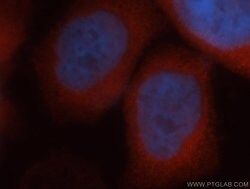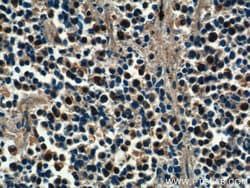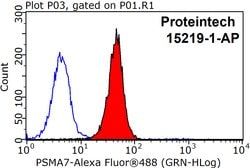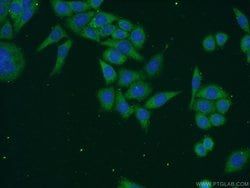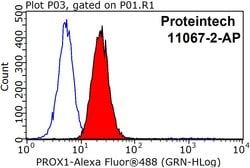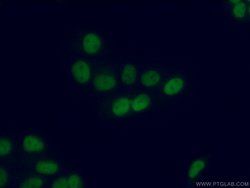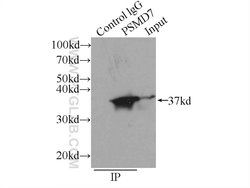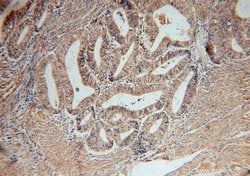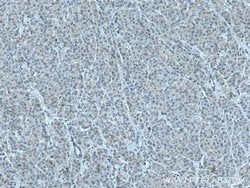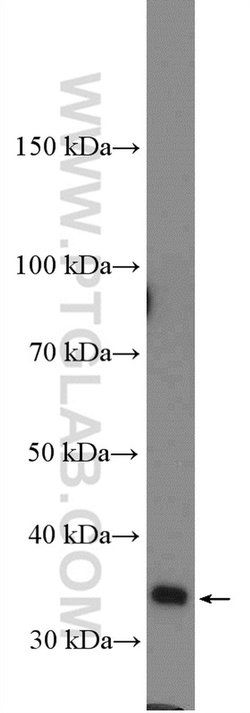50-173-0663
PSMD7 Rabbit anti-Human, Mouse, Polyclonal, Proteintech
Manufacturer: Proteintech Group Inc
Select a Size
| Pack Size | SKU | Availability | Price |
|---|---|---|---|
| Each of 1 | 50-173-0663-Each-of-1 | In Stock | ₹ 44,150.23 |
50-173-0663 - Each of 1
In Stock
Quantity
1
Base Price: ₹ 44,150.23
GST (18%): ₹ 7,947.041
Total Price: ₹ 52,097.271
Antigen
PSMD7
Classification
Polyclonal
Conjugate
Unconjugated
Gene
PSMD7
Gene Alias
MOV34, Mov34 protein homolog, MOV34L, P40, Proteasome subunit p40, PSMD7, Rpn8, S12
Host Species
Rabbit
Purification Method
Antigen Affinity Chromatography
Regulatory Status
RUO
Gene ID (Entrez)
17463, 5713
Content And Storage
-20°C
Form
Liquid
Applications
Flow Cytometry, Immunocytochemistry, Immunofluorescence, Immunoprecipitation, Western Blot
Concentration
0.13 mg/mL
Formulation
PBS with 50% glycerol and 0.02% sodium azide; pH 7.3
Gene Accession No.
P26516, P51665
Gene Symbols
Psmd7
Immunogen
PSMD7 Fusion Protein Ag8905
Quantity
150 μL
Primary or Secondary
Primary
Target Species
Human, Mouse
Product Type
Antibody
Isotype
IgG
Description
- Proteolytic degradation is critical to the maintece of appropriate levels of short-lived and regulatory proteins as important and diverse as those involved in cellular metabolism, heat shock and stress response, antigen presentation, modulation of cell surface receptors and ion channels, cell cycle regulation, transcription, and signaling factors
- The ubiquitin-proteasome pathway deconstructs most proteins in the eukaryotic cell cytosol and nucleus
- Others are degraded via the vacuolar pathway which includes endosomes, lysosomes, and the endoplasmic reticulum
- The 26S proteasome is an ATP-dependent, multisubunit (approximately 31), barrel-shaped molecular machine with an apparent molecular weight of approximately 2.5 MDa
- It consists of a 20S proteolytic core complex which is crowned at one or both ends by 19S regulatory subunit complexes
- The 19S regulatory subunits recognize ubiquitinated proteins and play an essential role in unfolding and translocating targets into the lumen of the 20S subunit
- An enzymatic cascade is responsible for the attachment of multiple ubiquitin molecules to lysine residues of proteins targeted for degradation
- Several genetic diseases are associated with defects in the ubiquitin-proteasome pathway
- Some examples of affected proteins include those linked to cystic fibrosis, Angelman′s syndrome, and Liddle syndrome.
Compare Similar Items
Show Difference
Antigen: PSMD7
Classification: Polyclonal
Conjugate: Unconjugated
Gene: PSMD7
Gene Alias: MOV34, Mov34 protein homolog, MOV34L, P40, Proteasome subunit p40, PSMD7, Rpn8, S12
Host Species: Rabbit
Purification Method: Antigen Affinity Chromatography
Regulatory Status: RUO
Gene ID (Entrez): 17463, 5713
Content And Storage: -20°C
Form: Liquid
Applications: Flow Cytometry, Immunocytochemistry, Immunofluorescence, Immunoprecipitation, Western Blot
Concentration: 0.13 mg/mL
Formulation: PBS with 50% glycerol and 0.02% sodium azide; pH 7.3
Gene Accession No.: P26516, P51665
Gene Symbols: Psmd7
Immunogen: PSMD7 Fusion Protein Ag8905
Quantity: 150 μL
Primary or Secondary: Primary
Target Species: Human, Mouse
Product Type: Antibody
Isotype: IgG
Antigen:
PSMD7
Classification:
Polyclonal
Conjugate:
Unconjugated
Gene:
PSMD7
Gene Alias:
MOV34, Mov34 protein homolog, MOV34L, P40, Proteasome subunit p40, PSMD7, Rpn8, S12
Host Species:
Rabbit
Purification Method:
Antigen Affinity Chromatography
Regulatory Status:
RUO
Gene ID (Entrez):
17463, 5713
Content And Storage:
-20°C
Form:
Liquid
Applications:
Flow Cytometry, Immunocytochemistry, Immunofluorescence, Immunoprecipitation, Western Blot
Concentration:
0.13 mg/mL
Formulation:
PBS with 50% glycerol and 0.02% sodium azide; pH 7.3
Gene Accession No.:
P26516, P51665
Gene Symbols:
Psmd7
Immunogen:
PSMD7 Fusion Protein Ag8905
Quantity:
150 μL
Primary or Secondary:
Primary
Target Species:
Human, Mouse
Product Type:
Antibody
Isotype:
IgG
Antigen: SERPINB2
Classification: Polyclonal
Conjugate: Unconjugated
Gene: SERPINB2
Gene Alias: HsT1201, Monocyte Arg serpin, PAI, PAI 2, PAI2, PAI-2, PLANH2, Serpin B2, SERPIN2, SERPINB2, Urokinase inhibitor
Host Species: Rabbit
Purification Method: Antigen Affinity Chromatography
Regulatory Status: RUO
Gene ID (Entrez): 5055
Content And Storage: -20°C
Form: Liquid
Applications: Immunohistochemistry (Paraffin), Immunoprecipitation, Western Blot
Concentration: 0.27 mg/mL
Formulation: PBS with 50% glycerol and 0.02% sodium azide; pH 7.3
Gene Accession No.: P05120
Gene Symbols: SERPINB2
Immunogen: SERPINB2 Fusion Protein Ag8906
Quantity: 150 μL
Primary or Secondary: Primary
Target Species: Human
Product Type: Antibody
Isotype: IgG
Antigen:
SERPINB2
Classification:
Polyclonal
Conjugate:
Unconjugated
Gene:
SERPINB2
Gene Alias:
HsT1201, Monocyte Arg serpin, PAI, PAI 2, PAI2, PAI-2, PLANH2, Serpin B2, SERPIN2, SERPINB2, Urokinase inhibitor
Host Species:
Rabbit
Purification Method:
Antigen Affinity Chromatography
Regulatory Status:
RUO
Gene ID (Entrez):
5055
Content And Storage:
-20°C
Form:
Liquid
Applications:
Immunohistochemistry (Paraffin), Immunoprecipitation, Western Blot
Concentration:
0.27 mg/mL
Formulation:
PBS with 50% glycerol and 0.02% sodium azide; pH 7.3
Gene Accession No.:
P05120
Gene Symbols:
SERPINB2
Immunogen:
SERPINB2 Fusion Protein Ag8906
Quantity:
150 μL
Primary or Secondary:
Primary
Target Species:
Human
Product Type:
Antibody
Isotype:
IgG
Antigen: NDUFB6
Classification: Polyclonal
Conjugate: Unconjugated
Gene: NDUFB6
Gene Alias: B17, CI, CI B17, Complex I B17, NDUFB6
Host Species: Rabbit
Purification Method: Antigen Affinity Chromatography
Regulatory Status: RUO
Gene ID (Entrez): 230075, 297990, 4712
Content And Storage: -20°C
Form: Liquid
Applications: Immunohistochemistry (Paraffin), Western Blot
Concentration: 0.13 mg/mL
Formulation: PBS with 50% glycerol and 0.02% sodium azide; pH 7.3
Gene Accession No.: O95139, Q3UIU2
Gene Symbols: NDUFB6
Immunogen: NDUFB6 Fusion Protein Ag8908
Quantity: 150 μL
Primary or Secondary: Primary
Target Species: Human, Mouse, Rat
Product Type: Antibody
Isotype: IgG
Antigen:
NDUFB6
Classification:
Polyclonal
Conjugate:
Unconjugated
Gene:
NDUFB6
Gene Alias:
B17, CI, CI B17, Complex I B17, NDUFB6
Host Species:
Rabbit
Purification Method:
Antigen Affinity Chromatography
Regulatory Status:
RUO
Gene ID (Entrez):
230075, 297990, 4712
Content And Storage:
-20°C
Form:
Liquid
Applications:
Immunohistochemistry (Paraffin), Western Blot
Concentration:
0.13 mg/mL
Formulation:
PBS with 50% glycerol and 0.02% sodium azide; pH 7.3
Gene Accession No.:
O95139, Q3UIU2
Gene Symbols:
NDUFB6
Immunogen:
NDUFB6 Fusion Protein Ag8908
Quantity:
150 μL
Primary or Secondary:
Primary
Target Species:
Human, Mouse, Rat
Product Type:
Antibody
Isotype:
IgG
Antigen: TUSC3
Classification: Polyclonal
Conjugate: Unconjugated
Gene: TUSC3
Gene Alias: M33, MRT7, N33, OST3A, Protein N33, tumor suppressor candidate 3, TUSC3
Host Species: Rabbit
Purification Method: Antigen Affinity Chromatography
Regulatory Status: RUO
Gene ID (Entrez): 290783, 7991, 80286
Content And Storage: -20°C
Form: Liquid
Applications: Western Blot
Concentration: 0.16 mg/mL
Formulation: PBS with 50% glycerol and 0.1% sodium azide; pH 7.3
Gene Accession No.: Q13454, Q8BTV1
Gene Symbols: Tusc3
Immunogen: TUSC3 Fusion Protein Ag8912
Quantity: 150 μL
Primary or Secondary: Primary
Target Species: Human, Mouse, Rat
Product Type: Antibody
Isotype: IgG
Antigen:
TUSC3
Classification:
Polyclonal
Conjugate:
Unconjugated
Gene:
TUSC3
Gene Alias:
M33, MRT7, N33, OST3A, Protein N33, tumor suppressor candidate 3, TUSC3
Host Species:
Rabbit
Purification Method:
Antigen Affinity Chromatography
Regulatory Status:
RUO
Gene ID (Entrez):
290783, 7991, 80286
Content And Storage:
-20°C
Form:
Liquid
Applications:
Western Blot
Concentration:
0.16 mg/mL
Formulation:
PBS with 50% glycerol and 0.1% sodium azide; pH 7.3
Gene Accession No.:
Q13454, Q8BTV1
Gene Symbols:
Tusc3
Immunogen:
TUSC3 Fusion Protein Ag8912
Quantity:
150 μL
Primary or Secondary:
Primary
Target Species:
Human, Mouse, Rat
Product Type:
Antibody
Isotype:
IgG

